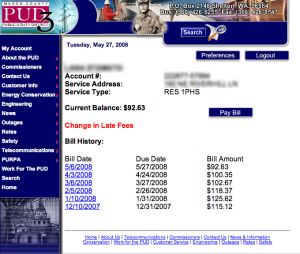
Image Credit: Flickr/Lanacar – CC BY 2.0
The Wall Street Journal has an interesting article on the rise of fees as a mechanism of government cash raising in lieu of raising taxes.
Scranton, Pa. is turning to an unlikely source for fiscal strength: garbage.
The distressed city in northeastern Pennsylvania began charging residents a $300 annual fee in 2014 to collect their trash, up from $178. That 68% increase has since raised millions for Scranton, one of the many steps being taken to restore the former coal-mining hub to solid financial footing after decades of decline.
Cash-strapped American cities are increasingly asking their residents to pay higher amounts for mundane services as they struggle to pay for mounting pension obligations, cover costly infrastructure improvements and replace revenue depleted by the last recession. Bills are rising for everything from parking tickets and 911 calls to sewer service and trash pickup.
…
One small Midwestern town, Danville, Ill., is raising its fees for a specific purpose: to chip away at more than $100 million in liabilities owed to police and fire department retirees. The city of about 30,000 first attached a $2 a month “public safety pension fee” to residents’ sewer bills in 2014 and in December pushed that charge to $22.25 for those in single-family homes.
The article notes that cities are doing this in part because of limitations on their ability to raise taxes. It’s very clear that financial distress can send cities towards things like fees and fines for revenue, and that at times this has become abusive (particularly the use of fines).
However, I see this as also driven by market trends. I’ve noticed that there’s been a move away from headline pricing and towards fees by companies as well. Think about the airlines, for example. They figured out that consumers often simply pick the lowest fare. So their ability to raise fares is very limited. But they can create an array of add-on fees, like checked baggage fees or decent seat fees, to raise revenues in other ways. It seems to me that various add-on fees are much more common than they used to be. (Banks make a killing off of them).
American consumer seem to be heavily fixated on headline pricing. In the government context this would mean something like property tax rates. Raise property taxes and you have a revolt on your hands. Plus your next election opponent will attack you for raising taxes. But perhaps there will be less chirping if the same revenue is raised via increases in fees.
In short, I see another part of this as a response to consumer behavior, because it’s similar to what we are seeing corporations do.
from Aaron M. Renn
http://www.urbanophile.com/2018/02/08/the-big-fee/
No comments:
Post a Comment